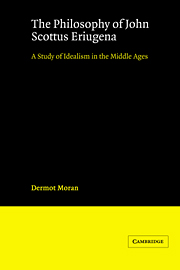Book contents
- Frontmatter
- Contents
- Preface
- Acknowledgments
- Chronology
- List of abbreviations
- 1 European intellectual culture in the ninth century
- 2 The predestination debate
- 3 Eriugena's life and early writings
- 4 The Greek awakening
- 5 The Periphyseon
- 6 Eriugena as philosopher
- 7 Eriugena's sources
- 8 Dialectic, philosophy, and the life of the mind
- 9 The meaning of human nature
- 10 Self-knowledge and self-definition: the nature of human knowing
- 11 The meaning of non-being
- 12 The meaning of nature
- 13 Eriugena's influence on later mediaeval philosophy
- 14 Conclusion
- Bibliography
- Index nominum
- Index rerum
- Frontmatter
- Contents
- Preface
- Acknowledgments
- Chronology
- List of abbreviations
- 1 European intellectual culture in the ninth century
- 2 The predestination debate
- 3 Eriugena's life and early writings
- 4 The Greek awakening
- 5 The Periphyseon
- 6 Eriugena as philosopher
- 7 Eriugena's sources
- 8 Dialectic, philosophy, and the life of the mind
- 9 The meaning of human nature
- 10 Self-knowledge and self-definition: the nature of human knowing
- 11 The meaning of non-being
- 12 The meaning of nature
- 13 Eriugena's influence on later mediaeval philosophy
- 14 Conclusion
- Bibliography
- Index nominum
- Index rerum
Summary
It is impossible to understand Eriugena's philosophy unless it is seen in the context of the world-picture he absorbed from his extensive reading of ancient authors. This world-picture was essentially Neoplatonic in inspiration, as Aristotle's works were in general almost unknown to the early mediaeval Latin West, except through the paraphrase of the Categories, known as the Categoriae decem, and also through the commentaries of Boethius. In this chapter I shall begin by giving some details of Eriugena's borrowings from Neoplatonic authors, as a first step towards understanding his own philosophical contribution and originality.
What form of Neoplatonism most strongly influenced John Scottus? What are the principal Neoplatonic elements of his system? Eriugena espouses both Neoplatonism and Christianity, and for him, the two never come into contrast or opposition. Thus in the Homilia, Eriugena is able to say in a Platonic manner that man gets his body from this world but his soul from another world. He does not reflect Augustine's worries about the possibility of conflict between Neoplatonic doctrine and Christian teaching on such matters as the pre-existence of the soul, the nature of creation and salvation, or the meaning of nature and grace. Eriugena's main concern is in fact to integrate into a single coherent system the diverse Neoplatonisms he received from Greek and Latin authorities (see, e.g., IV.8o4C-8o5b) and to communicate this integrated system as the truth of Christianity and the meaning of nature itself.
- Type
- Chapter
- Information
- The Philosophy of John Scottus EriugenaA Study of Idealism in the Middle Ages, pp. 103 - 122Publisher: Cambridge University PressPrint publication year: 1989



